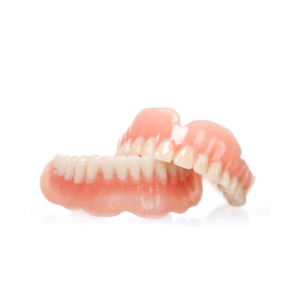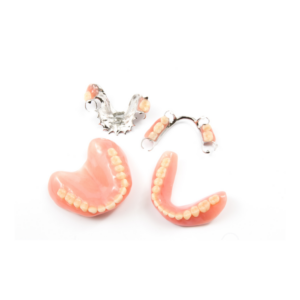WHAT IS A DENTURES?
Dentures, commonly known as false teeth, are prosthetic devices designed to replace missing teeth and surrounding tissues, allowing for normal oral function. They come in two main types: complete and partial dentures. Complete dentures are recommended when all teeth are missing, while partial dentures are used when only some teeth are absent. Each denture is custom-made to fit the unique shape of an individual’s gums and teeth.
Complete dentures cover the upper jaw, including the roof of the mouth, and fit over the lower jaw in a horseshoe shape. These traditional dentures are removable and should be taken out at night for cleaning. On the other hand, partial dentures consist of artificial teeth attached to a gum-colored base, supported by a metal framework that helps secure them in place. They prevent the remaining natural teeth from shifting, maintaining proper alignment and stability in the mouth.

TYPES OF DENTURES
Dentures can be classified into three main types: Complete Dentures, Partial Dentures, and Implant-Supported Dentures.

1. Complete Dentures
Complete dentures are removable prosthetic devices used when all natural teeth in the jaw are missing. They can be either conventional or immediate, depending on when they are placed after tooth extraction.
2. Partial Dentures
Partial dentures are designed for individuals who still have some natural teeth. They help fill the gaps left by missing teeth and are typically made from acrylic resin, porcelain, or a combination of metal and acrylic for added durability.


3. Implant-Supported Dentures
Unlike traditional dentures that rest on the gums, implant-supported dentures are secured to the jawbone using dental implants. This type of denture provides enhanced stability and support while replacing multiple missing teeth at once.
WHAT IS THE PROCEDURE INVOLVED IN PLACING DENTURES?
Step 1: Initial Consultation
The denture process begins with an initial consultation with the dentist. During this visit, the dentist will conduct a thorough oral examination to determine the most suitable type of denture based on your needs—whether a complete or partial denture. If any extractions or other dental procedures are required before getting dentures, they will be assessed at this stage. Additionally, the dentist will discuss the treatment plan, cost, and expected outcomes while addressing any questions you may have.
Step 2: Taking Impressions
To ensure a proper fit, the dentist will take an impression of the jaw where teeth are missing.
A plaster model of your jaw will be created by pouring the impression with gypsum.
A special acrylic tray will be custom-made based on the jaw model.
This tray will be placed in your mouth for border molding, ensuring the denture stays securely in place.
A final impression will then be taken using the same tray.
The final impression will again be cast with gypsum, and acrylic plates will be created, followed by a wax-up rim.
These wax rims with acrylic plates will be placed in your mouth to establish proper alignment for your future teeth, a process known as “jaw relation,” ensuring effective chewing.
Artificial teeth will be arranged in the correct positions on the wax model.
The acrylic plates will once again be tested in your mouth to confirm proper teeth alignment. Any necessary adjustments will be made at this stage before the final denture is fabricated.
Step 3: Denture Placement
The final denture will be fitted in your mouth, and you will receive instructions on how to properly insert, remove, and care for your dentures to ensure comfort and longevity.
BENEFITS OF DENTURES
Dentures offer several advantages, including:
A natural-looking smile that enhances facial appearance.
Improved ability to chew food properly, aiding digestion.
Enhanced speech clarity.
Boosted self-esteem and confidence.
A cost-effective option for tooth replacement.
Support for facial muscles, preventing sagging.
Improved overall mouth function, including better biting and chewing efficiency.
HOW TO TAKE CARE OF THE DENTURES?
Proper denture care is essential for maintaining oral hygiene and ensuring their longevity. Regular cleaning and maintenance help prevent discomfort, oral infections, and other dental issues. Here’s how you can take care of your dentures effectively:
1. Keep Your Dentures Clean
To maintain cleanliness, brush your dentures daily using a soft-bristled, non-abrasive brush. Although dentures are artificial, plaque and bacteria can still accumulate, potentially harming your gums and remaining teeth. If possible, rinse your dentures with warm water after every meal. For complete denture wearers, thorough brushing once a day is sufficient.
2. Overnight Protection
To keep dentures in good condition, soak them overnight in water or a dentist-recommended denture solution. Avoid using chlorine-based solutions, as they can weaken the material. Before wearing them in the morning, rinse thoroughly with clean water to remove any residual chemicals from the soaking process.
3. Regular Monitoring
Check your dentures regularly for any signs of looseness, discomfort, or changes in bite. If your dentures slip, feel uncomfortable, or cause irritation, consult your dentist promptly. Ill-fitting dentures can lead to infections and other oral health issues.
DO'S AND DONT'S WHILE DENTURES ON
Dos:
✔ Soak your dentures overnight in water or a dentist-recommended solution.
✔ Rinse your dentures thoroughly before wearing them in the morning.
✔ Brush daily using a soft-bristled brush and dentist-approved toothpaste.
✔ Maintain good oral hygiene by caring for your gums, tongue, and mouth.
Don’ts:
✘ Avoid biting into hard foods to prevent damage.
✘ Do not use toothpicks or sharp objects on your dentures.
✘ Handle your dentures with care, as they are delicate and can break if dropped.
✘ If your dentures become loose, avoid trying to fix them yourself—visit your dentist for adjustments.
FREQUENTLY ASKED QUESTIONS
1. What are dentures?
Dentures are removable prosthetic devices designed to replace missing teeth and restore oral function. They can be complete (for full tooth loss) or partial (for replacing a few missing teeth).
2. How long does it take to get used to dentures?
It may take a few weeks to adjust to wearing dentures. Initially, you might experience minor discomfort, increased saliva production, or difficulty speaking and eating, but these issues typically improve over time.
3. How do I clean my dentures?
Dentures should be brushed daily with a soft-bristled brush and non-abrasive toothpaste. Rinse them after meals and soak them overnight in water or a denture-cleaning solution as recommended by your dentist.
PEOPLE WHO VIEWED THIS PAGE ALSO VISITED
- Clear Aligners
- Braces & Aligners
- Wisdom Teeth Removal
- Advanced Gum Treatment
- Mouth Ulcers
